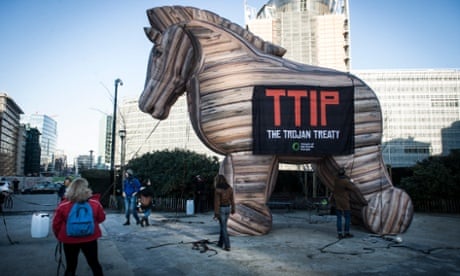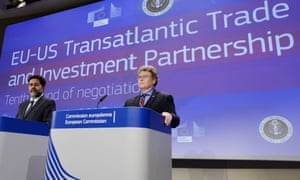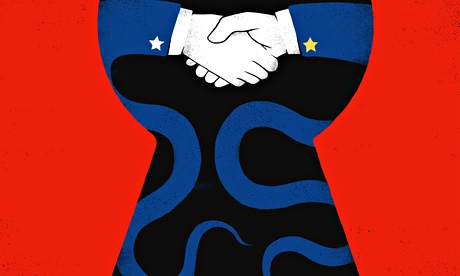
Anti-TTIP graffiti in Brussels, Belgium. Photograph: Francois Lenoir/Reuters
Stuart Jeffries in The Guardian
“Sometimes,” says a character in David Foster Wallace’s novel The Pale King, “what’s important is dull. Sometimes it’s work. Sometimes the important things aren’t works of art for your entertainment.” It is worth bearing that in mind as we consider TTIP, the most boring thing we’re supposed to get angry about since – ooh … was it PFI schemes that nobbled hospitals, eviscerated schools and left Britain £222bn in debt? Or was it the asymmetrical constitutional ramifications inherent in the West Lothian question? Or George Osborne’s incomprehensible pension changes involving auto-enrolment annuities, tax wrappers, pots and draw-downs? Christine Lagarde’s last press conference about the Greek debt crisis? Maybe it was your last mobile phone bill.
Stuart Jeffries in The Guardian
“Sometimes,” says a character in David Foster Wallace’s novel The Pale King, “what’s important is dull. Sometimes it’s work. Sometimes the important things aren’t works of art for your entertainment.” It is worth bearing that in mind as we consider TTIP, the most boring thing we’re supposed to get angry about since – ooh … was it PFI schemes that nobbled hospitals, eviscerated schools and left Britain £222bn in debt? Or was it the asymmetrical constitutional ramifications inherent in the West Lothian question? Or George Osborne’s incomprehensible pension changes involving auto-enrolment annuities, tax wrappers, pots and draw-downs? Christine Lagarde’s last press conference about the Greek debt crisis? Maybe it was your last mobile phone bill.
Add up the boredom you experienced on each of those occasions, multiply the result by the international coefficient of tedium (which, as you know, is 27.5) and that’s how bored the international trade deal known as TTIP will make you.
The Guardian’s expert on obfuscation by bureaucratese and acronym, Steven Poole, recently argued that TTIP could be a conspiracy to pull some very thick wool over our eyes. We live in an age when we’re so accustomed to being entertained that we haven’t the temperament to do the difficult work of penetrating the wool of boring. So we’re going to take that wool, roll it into a ball and leave it for the cat to play with. No, don’t look at the cat. Look at me. Focus.
FacebookTwitterPinterest Ignacio Garcia Bercero (left), the EU chief negotiator for TTIP, and his US counterpart Dan Mullaney. Photograph: Thierry Charlier/AFP/Getty Images
So, what is TTIP?
So, what is TTIP?
Remember when acronyms starting with two TTs were lovely things such as TTFN (ta-ta for now)? TTIP isn’t like that. It stands for Transatlantic Trade and Investment Partnership. Last month, the European parliament voted to allow the European commission to continue negotiations with the United States to create the world’s largest free-trade zone, which is what TTIP is all about.
Conservative trade spokesman Emma McClarkin said: “I welcome the fact that, following weeks of parliamentary ping-pong and attempts by socialist and protectionist MEPs to derail the process, we finally have a clear backing for TTIP.” Right, stop thinking how much fun parliamentary ping-pong sounds, particularly if a cat joins in.
What McClarkin is looking forward to is greater regulatory harmonisation and a consequent boost for business, some of it, incredibly, British. Today, for instance, the US and EU have different regulations testing the safety of cars, drugs and soft furnishings. That imposes costs on transatlantic exporters of cars, drugs and soft furnishings – especially, you would think, on exporters of upholstery for drug dealers’ cars. One possible consequence of harmonisation could be a boost for British car exports. Imagine: one day Americans will be driving trim little Nissans made in Sunderland rather than ludicrous Hummers concocted in the bowels of hell.
There are other projected benefits. US ambassador to the EU Anthony L Gardner argues that TTIP is, if you’ll pardon the expression, geopolitically pertinent, and that it would “provide an economic equivalent to Nato” that would settle “the rules of world trade before others do it for us”. Think about it this way: right now, Vladimir Putin can, if he chooses, strip to the waist for a photo op in which he turns off the gas pipe from Russia to Europe. That’s not good enough. Instead of being dependent on nasty Russian gas and oil, then, as a result of TTIP, the EU might become dependent on lovely American and Canadian gas and oil. That’s one reason behind the EU’s call for a dedicated chapter in TTIP on energy and raw materials. Instead of Russia isolating the EU, the EU could isolate Russia. Sweet.
We have been invited to pronounce TTIP “tea tip”. Don’t these knuckleheads have any sense of history? The world’s most famous tea tip was in Boston in 1773, and that resulted in the marvellous era of transatlantic cooperation known as the American War of Independence.
TTIP is not to be confused with TPP, which is the Trans-Pacific Partnership, involving 12 countries including the US, Australia and Brunei, and which, like TTIP, is still under negotiation.
There is also, incidentally, something called Ceta, which stands for Comprehensive Economic and Trade Agreement. It is like TTIP but for Canada and Europe and, so far as I understand it, means that Europeans will soon be bathing in maple syrup while reading Margaret Atwood novels. Which is probably nicer than it sounds. Ceta is due to be ratified by the European parliament later this year but the document is currently undergoing a process of what is called “legal scrubbing”, which sounds like the sort of thing Americans do to their chickens, but in fact is another species of the kind of gobbledegook rampant in modern life and means minimising the document’s exposure to legal action.
But that’s not all. There is also Nafta, the North American Free Trade Agreement. It was established in 1994 and, proponents of TTIP think, demonstrates the kind of inspiring benefits and harmonisation of standards that might result if TTIP comes into force. Think of it this way. Just as, thanks to Nafta, for the past 21 years Americans have been saying “aboot” and forming their own mariachi bands, Mounties have been wearing sombreros and Mexicans putting maple syrup on their quesadillas, so in the future, thanks to TTIP, Americans might drink coffee from cups the size of thimbles, while Europeans might wear 10-gallon hats even though, on average, we’ve only got six-gallon-sized heads and so would look ridiculous.
But seriously. How is TTIP going to affect me?
TTIP will hit Europeans like you in the pocket, critics argue, so you need to pay attention. While the European commission estimates that, by 2027, TTIP could boost the size of the EU economy by £94bn or 0.5% of GDP, an economic study by Jeronim Capaldo of the Global Development and Environment Institute at Tufts University argues that the commission’s econometric modelling is jejune and that, in fact, TTIP will clobber Europeans. Capaldo predicts 600,000 European job losses as a result of TTIP, a net fall in EU exports, declining GDPs for EU member states and a fall in Europeans’ personal income.
Why people are so angry about TTIP?
Because Americans are, with all due respect, disgusting slobs always chasing a fast buck and thus very different from us fragrant Europeans who are, like Mary Poppins, practically perfect in every way. One worry is that the main goal of TTIP is to remove EU regulations that stop its citizens being poisoned, killed or subject to rampant pollution so that more profits can be made by corporations on both sides of the Atlantic.
Because Americans are, with all due respect, disgusting slobs always chasing a fast buck and thus very different from us fragrant Europeans who are, like Mary Poppins, practically perfect in every way. One worry is that the main goal of TTIP is to remove EU regulations that stop its citizens being poisoned, killed or subject to rampant pollution so that more profits can be made by corporations on both sides of the Atlantic.

Do you have concerns about TTIP?
For instance, critics argue that if TTIP involves, as the EU hopes, a commitment that would guarantee automatic licences for all future US crude oil and gas exports to Europe, that would result in a boom in US fracking to keep Europeans powered with shale gas, not to mention greater exploitation of oil from Canadian tar sands. Such developments, argue critics, would undermine not just the EU’s fuel quality directive but ruin what is left of the planet worth ruining.
Consider one aspect of TTIP that is giving European critics the particular pip. It involves another acronym, so steel yourselves. That acronym is ISDS, which stands for “investor-state dispute settlement”. This procedure would allow companies to sue foreign governments over claims of unfair treatment and to be entitled to compensation. Similar provisions in other treaties have allowed, for example, tobacco conglomerate Philip Morris to sue Uruguay and Australia for enacting anti-smoking legislation, and a Swedish energy company to take legal action against Germany for phasing out nuclear power.

An American chicken farm … US food is subject to different regulations. Photograph: Scott Olson/Getty Images
Critics say ISDS provisions undermine the power of national governments to act in the interests of their citizens. According to John Hilary, the executive director of War on Want, leaked documents show that medical and health services, social services, education, post, finance, telecommunications, transport, energy, water, environmental and cultural services are all on the table in TTIP, meaning that American corporations may have full access to them.
That is why there is a big banner outside the US embassy in Berlin that says (try saying this in the whiniest German voice you can muster): “Demokratie ist keine Handelsware,” which means democracy is not for trading.. Of course there is. It is also why there is some unacceptably unfunny graffiti in Malmö that depicts Barack Obama grinning oleaginously as a wooden horse marked TTIP is dragged into Europe.
In the UK, there are fears that ISDS could threaten the NHS because it might allow private firms running hospital services to sue the government if it chose to return the services to the public sector. The French government has already negotiated its film industry’s exemption from these provisions, so why can’t the NHS be, critics ask?
But the idea that ISDS is subverting democracy in favour of wicked corporations is a conspiracy theory, argues the European Policy Information Center, which – unforgivably – is already spelling “centre” the American way. Epicenter (as this group is acronymically known) is made up of groups, such as the UK’s Institute of Economic Affairs, that are in favour of TTIP. It argues that we shouldn’t worry about ISDS provisions. Why? Because the clause is a time-honoured means whereby corporations protect their investments, and does not undermine EU or member states’ right to pursue legitimate public policy objectives.
Or consider food regulations. While the EU has an impressively alliterative “farm to fork” strategy, for instance, regulating each link in the food chain, Americans pump their cattle and pigs with growth-promoting hormones banned in the EU. As a result, most US beef can’t be sold in the EU.
Worse, Americans use 82 pesticides banned in the EU. They wash their chicken in chlorinated water to kill bacteria. Ninety per cent of their soya, cotton and corn is genetically modified, while the EU allows member states to ban GM production. France, for instance, has banned GM, and Gauloises-smoking, beret-wearing toughs now patrol French fields to ensure that the excrescence of GM never sullies la belle France again.
So how could we possibly abandon these glorious European standards? The spectre of what lavishly moustachioed French farmer/anti-globalisation activist José Bové calls la malbouffe Americaine (rubbish American food) lurks behind the fears of this trading alliance. “Yeah?” retort Americans. “So how come you dumbass Europeans got mired in a horse-meat scandal in 2013 if your food regulations are so darn tootin’?” Which, you have to admit, is a good comeback.
Or consider data privacy rights. Don’t Americans realise that us Europeans don’t care to be snooped on by the NSA or have Google peer 24/7 into our very souls? MEPs are worried that TTIP might undermine EU data protection laws, and that’s why they have called for an “unambiguous, horizontal, self-standing provision” in it to guarantee citizens’ right to privacy.
Can something be horizontal and self-standing at the same time, you ask? It seems, I concede, unlikely.

A nurse holds a bag of saline solution … There are fears that trade deals could threaten the NHS. Photograph: Dimitris Legakis/Athena Pictures
Who is angry about TTIP?
Groups as disparate as War on Want and Ukip are united in anger about TTIP, though for different reasons. The Institute of Economic Affairs and the Conservative party are united in not being angry. The Labour party is – surprise! – conflicted.
Let’s consider Labour first. Labour MEP Jude Kirton-Darling, while arguing that ISDS is a “para-judicial and opaque system of private arbitration [that] allows companies to sue governments at great cost to the taxpayer”, also says that TTIP “could present us with a unique chance to regulate globalisation and to promote EU standards”, as well as “providing a much-needed boost to local economies, support to SMEs and new and exciting jobs and training opportunities”.
As for Ukip, Farage and his chums oppose TTIP because they think it’s a smokescreen. It’s not about trade, stupid, it’s about promoting “the political pretensions of a wannabe European superstate” and “setting up a parallel system that undermines national courts and national legal systems”, as the party’s international trade spokesman William Dartmouth MEP said in the European parliament last month.
After the vote went against Ukip’s stance last week, Dartmouth said that the only way citizens can defeat TTIP now is to vote to leave the European Union. But that’s Ukip’s answer to everything.
As for War on Want, its views are more typical of the pressure groups, unions, charities, NGOs and environmentalists that oppose TTIP. There are, for example, 480 such groups affiliated to the Berlin-based Stop TTIP campaign, whose supporting organisations include trade unions like the NUT, NGOs such as Friends of the Earth and Greenpeace and, my personal favourite, the Pirate Parties of Greece, Germany, Slovenia and the Netherlands, which have no leaders but a splendid flag. The campaign has a 2.3 million-signature petition calling on the EU to “stop these sinister trade deals”, by which it means both TTIP and CETA.
One of War On Want’s major concerns is that TTIP is being negotiated in secret. And with good cause: what nobody seems to have pointed out yet is that if TTIP negotiations do continue, as expected, until next year at the earliest, often in secret with (I suspect) all sorts of complicated car switcheroos, dead letter drops and tooled-up security johnnies in shades talking furtively into their wrists, the costs of negotiations might outweigh any supposed benefits of what they’re negotiating about.
But are TTIP negotiations being conducted in secret? Giacomo Lev Mannheimer of Istituto Bruno Leoni argues that is another conspiracy theory. And, indeed, he points to the dismal truth that there are lots and lots and lots of TTIP-related documents about its benefits, impact on public services, food and agriculture rules. Mannheimer makes a good point, though critics argue that the real meat of negotiations takes place elsewhere and ordinary European citizens don’t get a say in them.
What Mannheimer doesn’t consider is the more disturbing truth that there is an inverse relationship between the number of funny videos on YouTube and the user traffic on European commission websites relating to TTIP.
Indeed, if TTIP is about liberalising the parameters of boring, there are some of us who are prepared to fight back. And when I say “fight back”, I mean kick back on a sofa watching kittens get tickled.
Let’s consider Labour first. Labour MEP Jude Kirton-Darling, while arguing that ISDS is a “para-judicial and opaque system of private arbitration [that] allows companies to sue governments at great cost to the taxpayer”, also says that TTIP “could present us with a unique chance to regulate globalisation and to promote EU standards”, as well as “providing a much-needed boost to local economies, support to SMEs and new and exciting jobs and training opportunities”.
As for Ukip, Farage and his chums oppose TTIP because they think it’s a smokescreen. It’s not about trade, stupid, it’s about promoting “the political pretensions of a wannabe European superstate” and “setting up a parallel system that undermines national courts and national legal systems”, as the party’s international trade spokesman William Dartmouth MEP said in the European parliament last month.
After the vote went against Ukip’s stance last week, Dartmouth said that the only way citizens can defeat TTIP now is to vote to leave the European Union. But that’s Ukip’s answer to everything.
As for War on Want, its views are more typical of the pressure groups, unions, charities, NGOs and environmentalists that oppose TTIP. There are, for example, 480 such groups affiliated to the Berlin-based Stop TTIP campaign, whose supporting organisations include trade unions like the NUT, NGOs such as Friends of the Earth and Greenpeace and, my personal favourite, the Pirate Parties of Greece, Germany, Slovenia and the Netherlands, which have no leaders but a splendid flag. The campaign has a 2.3 million-signature petition calling on the EU to “stop these sinister trade deals”, by which it means both TTIP and CETA.
One of War On Want’s major concerns is that TTIP is being negotiated in secret. And with good cause: what nobody seems to have pointed out yet is that if TTIP negotiations do continue, as expected, until next year at the earliest, often in secret with (I suspect) all sorts of complicated car switcheroos, dead letter drops and tooled-up security johnnies in shades talking furtively into their wrists, the costs of negotiations might outweigh any supposed benefits of what they’re negotiating about.
But are TTIP negotiations being conducted in secret? Giacomo Lev Mannheimer of Istituto Bruno Leoni argues that is another conspiracy theory. And, indeed, he points to the dismal truth that there are lots and lots and lots of TTIP-related documents about its benefits, impact on public services, food and agriculture rules. Mannheimer makes a good point, though critics argue that the real meat of negotiations takes place elsewhere and ordinary European citizens don’t get a say in them.
What Mannheimer doesn’t consider is the more disturbing truth that there is an inverse relationship between the number of funny videos on YouTube and the user traffic on European commission websites relating to TTIP.
Indeed, if TTIP is about liberalising the parameters of boring, there are some of us who are prepared to fight back. And when I say “fight back”, I mean kick back on a sofa watching kittens get tickled.





